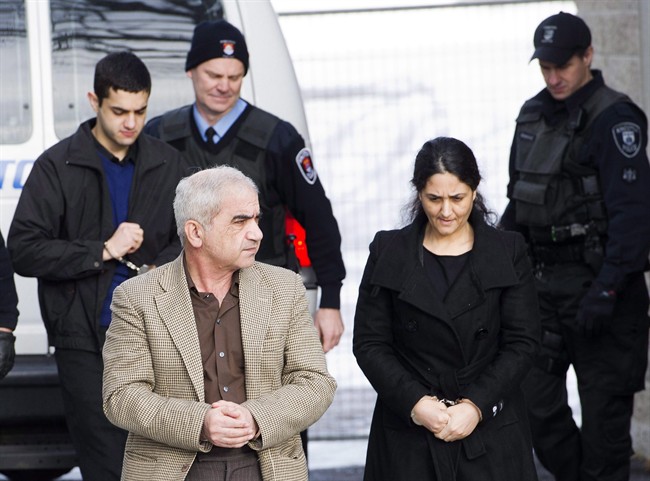TORONTO — A father, mother and son found guilty in the drowning deaths of three teenaged sisters and another woman who had apparently shamed the family lost their bid Wednesday to overturn their first-degree murder convictions.

In unanimously rejecting an appeal by the Shafia family members, Ontario’s top court ruled among things that expert evidence on so-called honour killings had been properly admitted at their trial and the son was properly tried as an adult.
“Honour was a recurrent theme of discussions among the appellants after the deaths of the deceased,” the Court of Appeal for Ontario said in its decision.
READ MORE: Shafia family appeal their murder conviction
Mohammad Shafia, his wife Tooba Yahya, and their son Hamed Shafia – immigrants originally from Afghanistan – were jointly convicted of murder in 2012.
They were arrested three weeks after the victims – Zainab Shafia, 19, Sahar Shafia, Geeti Shafia, 13, and Rona Amir Mohammad, 58 – were found in a submerged car at the Kingston Mills locks near Kingston, Ont. Autopsies found they had drowned.
At trial, the accused argued unsuccessfully that the deaths were accidental. Despite a lack of eyewitness testimony, the prosecution maintained the deaths were planned and deliberate, even if the exact role each accused played was unclear.
Evidence heard at trial included various statements the accused made before and after the deaths.
- Gas station clerk stabbed several times during violent attack at Ultramar in Montreal
- Canada’s most wanted list: Toronto suspect in fatal shooting at No. 1
- Man acquitted in Tina Fontaine murder found dead, says her aunt
- Canadians should expect politicians to support right to bail, Virani’s office says
READ MORE: Jury convicts 3 Shafia family members of first degree murder
For example, on police-installed listening devices, Mohammad Shafia was heard making derogatory comments about his daughters for dating, and accused them of shaming the family with their behaviour. He also referred to them as “whores.”
“We lost our honour,” Shafia said at one point. “They betrayed us immensely. They violated us immensely. There can be no betrayal, no treachery, no violation more than this.”
A key prosecution witness was Shahzrad Mojab, a professor at the University of Toronto and an expert on honour killings. Among five grounds raised on appeal, the Shafias argued that allowing her evidence was prejudicial.
Writing for the Appeal Court, Justice David Watt said Mojab’s testimony was essential to the jury’s ability to understand and evaluate other key evidence.
READ MORE: ‘Overwhelming’ evidence in Shafia case could only have led to guilty verdicts: Crown
Shafia, Watt said, repeatedly voiced his displeasure about how his dead daughters had dishonoured the family.
“The notion of honour and of killing another person motivated by besmirched honour originated with Shafia, not with Dr. Mojab,” Watt said. “Recall Shafia’s diatribe about the importance of honour.”
Hamed Shafia also argued for the first time on appeal that he was too young to be tried as an adult and should have been tried separately.
However, various documents the family used before and after immigrating to Canada in 2007 noted his date of birth as Dec. 31, 1990, which made him 18 when his sisters died. He argued new evidence showed he was actually 17 at the time, saying an ID issued by the Afghanistan government and other documents supported his contention.
WATCH: Crown to argue against new trials for Shafia trio in Ontario appeal court

The Appeal Court found no reason to allow the evidence, which it said was not compelling, and that doing so would not serve the interests of justice.
“When the deceased were killed, Hamed was not a ‘young person’,” the court concluded. “He was an adult, properly joined with his parents in a joint trial.”
Mohammad Shafia, a successful businessman, married Yahya in Afghanistan in 1988. Rona Amir, his first wife, could not have children but was close to the girls, who knew her as an aunt.
READ MORE: Lawyer tells court Shafia family member underage when convicted in ‘honour killings’
The Appeal Court rejected Yahya’s claims the trial judge made legal errors in characterizing her involvement in the killings when charging the jury.
“Charitably put, the evidence of guilt was overwhelming,” Watt said.



Comments